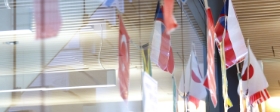
Study Abroad
Too often, overseas study programs send all students to the same destination at the same time, or require selection from an approved list of destinations. At the ISS, students select the country and university where they want to go and choose the kind of study they want to pursue. ISS students design their own study-abroad plans and submit them to the ISS for approval. Provided the Faculty determines that the plan meets certain criteria, students can pursue studies anywhere in the world.
Advantages of Studying Abroad with ISS
Types of Overseas Study
ISS overseas study programs are broadly divided into three types: short-stay, medium-stay, and long-stay. Students can study abroad for one semester, one year or even the minimum four weeks required to graduate. In choosing their overseas study, students consider factors such as content studied, expenses, and how they will manage their time over their four-year academic career. About 40% of ISS students take up the challenge of completing one semester (half a year) or longer of overseas study before they graduate.
| Short-stay | Medium-stay | Long-stay | |
|---|---|---|---|
| Period | 4–6 weeks | One semester (half year) |
Two semesters (one year) |
| Objectives | Language study/ volunteer work/ internships |
Faculty academic study/ language study |
Faculty academic study |
| Expenses | About ¥300,000 to ¥1 million |
About ¥800,000 to ¥3 million |
Twice the amount for medium-stay |
| Conditions for participation | None in principle | Conditions such as language score or GPA | Conditions such as language score or GPA |
| Recognized credits | None in principle*1 | Possible (About 5–10 credits) |
Possible (About 10–20 credits) |
*1: Summer programs for the purpose of acquiring credits are also available.
 If I take part in long-stay overseas study, will I still be able to graduate within four years?
If I take part in long-stay overseas study, will I still be able to graduate within four years?
Yes.
About 10% of our students tackle the challenge of long-stay overseas study and many graduate within four years. Moreover, credits earned at overseas universities can, if certain conditions are satisfied (number of class hours, equivalent in content to or better than classes at Gakushuin and so on), be counted toward the credits necessary for graduation from Gakushuin University (“recognized credits”). However, you must prepare beginning in your first year, including grades, study plans, and improving your English proficiency before you depart for your overseas study. Career-search activities will intensify around the second semester of your third year, so please bear this in mind when planning your schedule.
 What is credit recognition?
What is credit recognition?
Credit recognition is a program by which credits received from an overseas university while engaged in overseas study can be accepted as credits at Gakushuin University.
Certain conditions must be satisfied; for example, a certain number of hours of classroom time is required and the overseas courses must be equivalent to or at a higher level than the corresponding courses at Gakushuin.
Destinations
Provided you draw up a study plan that meets ISS criteria and it passes evaluation, you can pursue overseas study virtually anywhere in the world. In the years since ISS was established, the number of overseas study destinations has risen to over 250 locations in 30 countries.

 Do I have to do overseas study (exchange study) at a country in the English-speaking world?
Do I have to do overseas study (exchange study) at a country in the English-speaking world?
No. Overseas study must be completed in a country other than Japan, but it does not have to be in an English-speaking country.
In fact, a number of ISS students learn the basics of a second language such as German, French, Spanish or Chinese, then proceed to study in a non-English-speaking country abroad.
ISS Criteria for Overseas Study
For Short-stay Overseas Study
All three of the following conditions must be satisfied.
- Study will be conducted in a country or region other than Japan.
- The duration of the stay is 28 days or longer.
- Total study hours must satisfy one of the following conditions.
- 80 hours or more in the case of language study
- 32 hours or more in the case of specialized study
- 120 hours or more in the case of an internship or volunteer work
For Medium- and Long-stay Overseas Study
Both of the following conditions must be satisfied.
- Study (class) time is 12 hours or more per week for medium-stay overseas study and 24 hours or more per week for long-stay overseas study.
- The student is approved for enrollment in a university that satisfies either of the following conditions.
- The overseas university has a faculty related to the social sciences.
- The overseas university offers programs in foreign languages or has an attached or partner foreign-language school.
The term “overseas university” above includes equivalent institutions of higher learning.
In addition to the above, safety criteria separately stipulated by Gakushuin University and the ISS must be satisfied.
Approaches to Studying Abroad
Overseas study programs of one semester or longer are broadly divided into two categories: exchange programs and other study abroad programs. Both types are handled as overseas study that fulfills the conditions for graduation. After deciding the country and institution where they wish to study, students draft a plan for overseas study based on consideration of the respective advantages and disadvantages of exchange programs and other study abroad programs.
In both types of overseas study, programs such as grants and credit recognition are available. If tuition at the overseas university is payable, students’ tuition at Gakushuin University can be significantly reduced or exempted.
| Exchange programs | Other study abroad programs | |
|---|---|---|
| Overview | The student is sent as a representative of Gakushuin University to an overseas university with which the University has concluded a student-exchange agreement. To participate, the student must pass a selection process at Gakushuin University. | The student selects a study destination from a list of study destinations recommended by ISS or from the numerous study destinations handled by the University’s partner agents. If the student’s desired study destination is not in either list, the student may arrange his or her own agent and study destination. |
| Tuition | Tuition for Gakushuin University is paid. Tuition for the overseas university is waived (except for some). | Tuition for the overseas university is paid. Tuition for Gakushuin University is reduced (by about ¥612,000 per half year). |
Timing
Students can choose to take overseas study at any time from first-year spring break (immediately before second year) to fourth-year summer break. Students schedule their entire four-year curriculum themselves, including classwork, extracurricular activities, and job hunting.
Overseas Study Schedule
Step1Acquire basic knowledge by attending Study Abroad I.
This is a required course in the first semester of first year. Students will deepen their understanding of overseas training, which is a requirement for graduation from this department, acquire necessary information, and create a draft plan for study abroad. This is the first step in thinking about what kind of overseas experience is best for you and then putting it into practice.

Step2Draft a plan and prepare to submit it for approval.
Draft your plan. Start by asking yourself what sort of overseas study would be best for you, including time-frame, destination, content and other aspects. a couple of times a week, an advisor is available for consultation at the Faculty’s Study Abroad Office, so you can meet individually with the advisor to seek advice about your overseas study and ask questions. Also, because all students are required to study abroad to graduate, you have abundant opportunities to ask classmates and seniors about their experiences studying abroad.

Step3Submit your plan to ISS for review.
Submit your plan through a dedicated, student-only website. Your plan will be reviewed to ensure that it meets ISS criteria. If it is approved, the ISS will accept it as overseas study that satisfies the conditions for graduation.

Step4Prepare for your trip and travel to your overseas study destination.
Make all the necessary preparations, including crisis management and participation in orientation sessions for your trip. Then, depart for your destination. Plans do not always work out, and at times your overseas stay will not go as smoothly as you hoped. Nonetheless the knowledge you gain about the wider world and the strengths you develop in solving problems on your own will serve you throughout your life.

Step5In “Study Abroad II,” look back at your overseas study and link your experiences to future success.
Study Abroad II is a required course that you must complete in the semester immediately following your return to Japan. Think about the academic insights you gained by studying abroad and the cultural experiences and cross-cultural understanding you gained. Consider how you can link that understanding to your studies in the social sciences and apply it in shaping your career. This course gathers students who have returned from a broad range of countries and study destinations with widely differing experiences. The exceptional flexibility of ISS overseas study programs fosters incredible variety in the experiences students can share upon their return.


Related pages

 Japanese
Japanese

 Contact Us
Contact Us